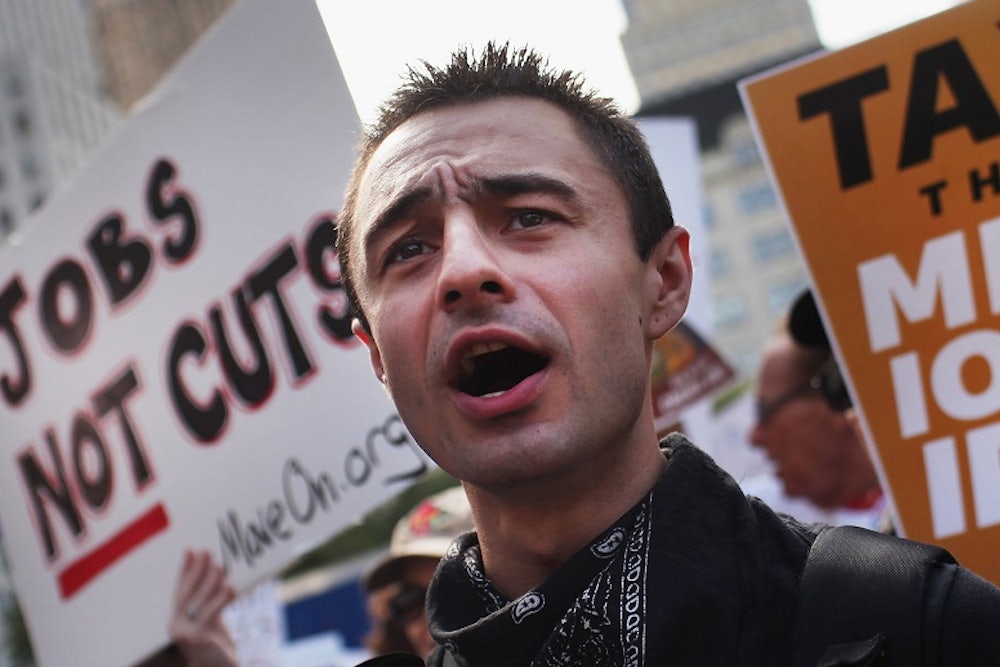High salaries have become an object of widespread attention in the past year, particularly among liberals worried about inequality. That's made some people pretty unhappy. Sometimes it's the upper class themselves, who think they are under assault and, from time to time, liken their critics to Hitler. But sometimes it's less hysterical observers who make an analytical argument: Morally repugnant or not, those high salaries have very little to do with inequality.
Both arguments suffer from a common flaw: That liberals want to tear down the rich, rather than lift up everybody else. One place you can see that clearly is in a new article by Zachary Karabell, a writer and money manager. In a contribution to Slate that ran on Thursday, Karabell makes three arguments:
- 1. Liberals blame executive compensation for rising income inequality.
- 2. Rising income inequality isn’t harmful.
- 3. Even if it is harmful, redistributive policies wouldn’t provide much help to low-income Americans.
The New York Times reported last weekend that the top 100 CEOs made $1.5 billion in 2013. After citing that number, Karabell writes, “These figures are often presented as evidence in an ongoing debate that assumes a direct link between the accumulation of wealth at the top of the income pyramid and the stagnation of income for the vast middle and bottom.” This is a straw man argument. A number of factors have contributed to the growing gap in pay between the highest-earners and the lowest, including technological change, globalization, the decline of unions, deregulation and other phenomena. Growing executive pay may be a part of that list, but it is one of many factors.
For Karabell’s second argument, he cites a recent article by New York Times writer Eduardo Porter. “[As] Porter noted recently,” Karabell writes, “claiming that wealth inequality is unambiguously harmful is more about ideology than evidence.”
Karabell makes a couple of mistakes here. First, wealth inequality and income inequality are different measures and cannot be used interchangeably. The word “wealth” doesn’t even appear in Porter’s article. In addition, Porter's take is more nuanced than Karabell's selective quoting suggests. For instance, Porter also writes, “[W]hile the effect of widening inequality may be exaggerated by some research, there is decent evidence that it leads to other inequities—in health and education, for instance.”
In fairness, Karabell’s main point has some truth. The economic consequences of rising income inequality are still uncertain. In a recent paper, Jared Bernstein, a left-leaning economist at the Center for Budget and Policy Priorities, could not find an unequivocal link between rising income inequality and slow economic growth. (Karabell cites him in his piece.) Other economists have come to similar conclusions. But since Bernstein published his paper, researchers at the International Monetary Fund found that income inequality is harmful for economic growth. In fact, they conclude that redistributive policies can boost growth. Karabell does not mention this work in his piece.
However, Karabell’s final argument is his most egregious:
The top 100 CEOs in the survey took home a total of $1.5 billion. That’s rather nice for them, but redistributing, say, $1 billion of that would do almost nothing to help the 100 million people at the bottom of the economic pyramid in the U.S. Even if you included upper management and got to, let’s say, $100 billion, the extra income distributed across American society would barely improve living standards.
Since Karabell is referring to the $1.5 billion the top 100 CEOs made in 2013, I assume his reference to $100 billion is an annual figure as well. And if he thinks $100 billion in additional redistribution “would barely improve living standards,” he does not understand the federal budget. President Obama’s plan to expand the Earned Income Tax Credit (EITC) would cost $60 billion over 10 years and lift half a million people out of poverty while helping another 10.1 million Americans in deep poverty. You could fund that and still have $940 billion to spend on antipoverty programs over the next decade. The federal government spent $61 billion in total on the EITC last year. On the Child Tax Credit, it was $57 billion. In January, Republicans and Democrats bitterly fought over food stamp cuts that ended up totaling $9 billion over a decade. An additional $100 billion in annual federal spending would have an immense effect on the living standards of low-income Americans.
Karabell reveals his fatal conceit when he writes, “The assumption of a causal link between excessive pay at the top and low growth and stagnant incomes fuels the drive to reframe the tax code toward greater redistribution.” That’s wrong. What drives liberals to reform the tax code at the expense of high-income individuals is the ability to use that revenue to help the lower- and middle-class. Whether excessive executive pay is at the root of rising inequality is beside the point. Critics of the liberal position don’t seem to understand this. If they did, who knows—maybe they would agree.
